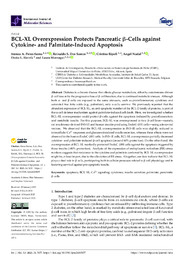Por favor, use este identificador para citar o enlazar este ítem:
https://hdl.handle.net/11000/38554Registro completo de metadatos
| Campo DC | Valor | Lengua/Idioma |
|---|---|---|
| dc.contributor.author | Perez-Serna, Atenea Alexandra | - |
| dc.contributor.author | dos Santos, Reinaldo S. | - |
| dc.contributor.author | Ripoll, Cristina | - |
| dc.contributor.author | Nadal, Angel | - |
| dc.contributor.author | Eizirik, Decio L. | - |
| dc.contributor.author | Marroqui Esclapez, Laura | - |
| dc.contributor.other | Departamentos de la UMH::Fisiología | es_ES |
| dc.date.accessioned | 2025-11-27T13:24:53Z | - |
| dc.date.available | 2025-11-27T13:24:53Z | - |
| dc.date.created | 2023 | - |
| dc.identifier.citation | International Journal of Molecular Sciences | es_ES |
| dc.identifier.issn | 1422-0067 | - |
| dc.identifier.issn | 1661-6596 | - |
| dc.identifier.uri | https://hdl.handle.net/11000/38554 | - |
| dc.description.abstract | Diabetes is a chronic disease that affects glucose metabolism, either by autoimmune-driven β-cell loss or by the progressive loss of β-cell function, due to continued metabolic stresses. Although both α- and β-cells are exposed to the same stressors, such as proinflammatory cytokines and saturated free fatty acids (e.g., palmitate), only α-cells survive. We previously reported that the abundant expression of BCL-XL, an anti-apoptotic member of the BCL-2 family of proteins, is part of the α-cell defense mechanism against palmitate-induced cell death. Here, we investigated whether BCL-XL overexpression could protect β-cells against the apoptosis induced by proinflammatory and metabolic insults. For this purpose, BCL-XL was overexpressed in two β-cell lines—namely, rat insulinoma-derived INS-1E and human insulin-producing EndoC-βH1 cells—using adenoviral vectors. We observed that the BCL-XL overexpression in INS-1E cells was slightly reduced in intracellular Ca2+ responses and glucose-stimulated insulin secretion, whereas these effects were not observed in the human EndoC-βH1 cells. In INS-1E cells, BCL-XL overexpression partially decreased cytokine- and palmitate-induced β-cell apoptosis (around 40% protection). On the other hand, the overexpression of BCL-XL markedly protected EndoC-βH1 cells against the apoptosis triggered by these insults (>80% protection). Analysis of the expression of endoplasmic reticulum (ER) stress markers suggests that resistance to the cytokine and palmitate conferred by BCL-XL overexpression might be, at least in part, due to the alleviation of ER stress. Altogether, our data indicate that BCL-XL plays a dual role in β-cells, participating both in cellular processes related to β-cell physiology and in fostering survival against pro-apoptotic insults. | es_ES |
| dc.format | application/pdf | es_ES |
| dc.format.extent | 18 | es_ES |
| dc.language.iso | eng | es_ES |
| dc.publisher | MDPI | es_ES |
| dc.relation.ispartofseries | 24 | es_ES |
| dc.relation.ispartofseries | 6 | es_ES |
| dc.rights | info:eu-repo/semantics/openAccess | es_ES |
| dc.rights | Attribution-NonCommercial-NoDerivatives 4.0 Internacional | * |
| dc.rights.uri | http://creativecommons.org/licenses/by-nc-nd/4.0/ | * |
| dc.subject | Apoptosis | es_ES |
| dc.subject | BCL-XL | es_ES |
| dc.subject | Ca2+ signaling | es_ES |
| dc.subject | Cytokines | es_ES |
| dc.subject | Insulin secretion | es_ES |
| dc.subject | Palmitate | es_ES |
| dc.subject | Pancreatic β-cells | es_ES |
| dc.subject.other | CDU::6 - Ciencias aplicadas::61 - Medicina::612 - Fisiología | es_ES |
| dc.title | BCL-XL Overexpression Protects Pancreatic β-Cells against Cytokine- and Palmitate-Induced Apoptosis | es_ES |
| dc.type | info:eu-repo/semantics/article | es_ES |
| dc.relation.publisherversion | https://doi.org/10.3390/ijms24065657 | es_ES |

Ver/Abrir:
8_2023_BCL-XL Overexpression Protects Pancreatic β-Cells against Cytokine- and Palmitate-Induced Apoptosis_ijms-24-05657 (1).pdf
3,96 MB
Adobe PDF
Compartir:
 La licencia se describe como: Atribución-NonComercial-NoDerivada 4.0 Internacional.
La licencia se describe como: Atribución-NonComercial-NoDerivada 4.0 Internacional.
.png)